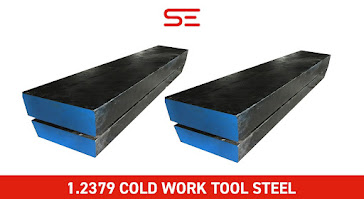What are the key properties and applications of P20 Steel Grade, and how does it compare to other tool steel grades in terms of performance and versatility?
P20 Steel, also known as P20 tool steel, is a versatile and widely used mold steel with several key properties and applications:
1.
Excellent Machinability: P20 Steel
exhibits good machinability, allowing for easy shaping and fabrication of molds
and components.
2.
High Hardenability: It has high hardenability, meaning it can be
hardened throughout its cross-section when properly heat-treated, resulting in
excellent wear resistance.
3.
Good Polishing Ability: P20 Steel
can be polished to a high surface finish, making it suitable for applications
requiring fine detail and aesthetic appeal.
4.
Good Toughness: P20 Steel offers good
toughness, which helps prevent cracking and chipping during use, enhancing the
durability of molds and components.
5.
Excellent Dimensional Stability: It maintains its shape and size even
under high temperatures and pressures, ensuring precision and consistency in
molded products.
Applications
of P20 Steel:
1.
Injection Molding: P20 Steel
is widely used for manufacturing injection molds for plastic components due to
its excellent polishability, wear resistance, and dimensional stability.
2.
Extrusion Dies: It is also used in the production of extrusion dies for plastic
and rubber processing, where high wear resistance and toughness are required.
3.
Die Casting: P20 Steel finds
applications in die casting dies for non-ferrous metals, providing good thermal
conductivity and resistance to thermal fatigue.
4.
Forming Tools: P20 steel is used to
manufacture forming tools, such as bending and stamping dies, where high wear
resistance and toughness are essential.
Comparison
with Other Tool Steel Grades:
1.
Compared to H13 Steel: While H13 Steel offers higher heat resistance and
hardness retention at elevated temperatures, P20 steel is preferred for
applications requiring polishability, ease of machining, and excellent wear
resistance at lower temperatures.
2.
Compared to D2 Steel: D2 Steel offers higher wear resistance and edge
retention compared to P20 steel, but it may be more difficult to machine and
polish. P20 steel is often chosen for applications where polishability and
machinability are critical.
3.
Compared to S7 Steel: S7 Steel provides superior impact resistance and
toughness compared to P20 steel, but P20 steel offers better wear resistance
and dimensional stability, making it more suitable for applications requiring
high precision and surface finish.
In summary, P20 Steel stands
out for its excellent combination of machinability, polishability, wear
resistance, toughness, and dimensional stability, making it a preferred choice
for a wide range of tooling and mold-making applications in the manufacturing
industry.
Sandeep Enterprises stands as a respected entity within the Steel Industry, underscored by its unwavering dedication to excellence, quality, and customer satisfaction. With a steadfast commitment to delivering superior products and services, Sandeep Enterprises has established itself as a trusted partner for clients across various sectors. From stringent quality control measures to innovative solutions tailored to meet diverse industry needs, Sandeep Enterprises consistently strives to exceed expectations. This dedication to excellence permeates every aspect of its operations, cementing its reputation as a leader in the Steel Industry.




Comments
Post a Comment